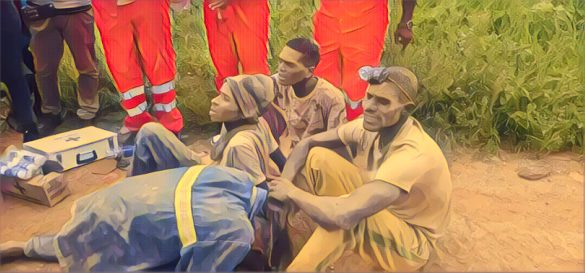Emerging from the depths of the earth, covered in mud and exhaustion, Owen Jaison, 24, takes a sigh of relief. He and 14 other artisanal miners had been trapped underground for three days after a mine shaft collapsed at Tsapauta in Penhalonga, Manicaland province. This near-death experience from January 4 to 8, 2024, was nothing short of a journey through hell.
Jaison, hailing from Insiza district in Matebeleland South province, over 460km away, was among the 15 who narrowly escaped death at Redwing Mine. Their survival, he believes, is nothing short of divine intervention. “It can only be God. It was a miracle, and I now believe miracles do happen,” he said, recalling the terror that began in the early hours of January 4.
Working underground, Jaison and his colleagues heard a noise, a forewarning of the impending danger as the shaft pillars began to collapse. With no escape route, they ventured deeper, seeking tunnels that did not exist. The threat of explosions, gas poisoning, and further cave-ins loomed large, their only sustenance being underground tree roots.
Days passed in a blur of fear and hopelessness. On the third day, weakened yet determined, they spotted a crack in the mine walls. A glimmer of hope sparked, and they began digging frantically, clawing their way towards the surface. The effort was agonizing, but their will to survive prevailed.
Finally, breaking through to the surface, they alerted rescuers, leading to the extraction of nine more miners. Unfortunately, two could not make it out on their own and were later rescued by a team.
The aftermath saw a mix of joyous reunions and stern reflection. Tawanda Siziba, who traveled from Mazowe, expressed immense relief upon finding his brother, one of the trapped miners, alive. “This is very unbelievable because, as a family, we had lost all hope,” he said.
Despite the suspension of mining activities at Redwing Mine by Mines and Mining Development Minister Zhemu Soda, illegal mining operations persist. Investigations reveal that these activities are often facilitated by politically connected groups, with little regard for the miners’ safety.
According to a report by Newsday, local community organizations in Manicaland have criticized the mining operations for flouting safety regulations, highlighting the absence of basic safety measures like barricading, protective clothing, and adequate timbering to prevent collapses. James Mupfumi, director of the Centre for Research and Development, emphasized the urgent need for governmental accountability and safety measures.
Redwing Mine, a hotspot for artisanal miners, draws individuals from across Zimbabwe, willing to risk their lives for gold, which often ends up in the hands of political elites. The allure of potential riches overshadows the dangers, but Jaison’s experience serves as a stark reminder of the risks involved.
Reflecting on his ordeal, Jaison has chosen to step away from artisanal mining. “I cannot gamble my life again,” he stated, grateful for his second chance at life. His story, and that of his fellow miners, underscores the desperate conditions under which many Zimbabweans seek their livelihood, often at great personal risk.


